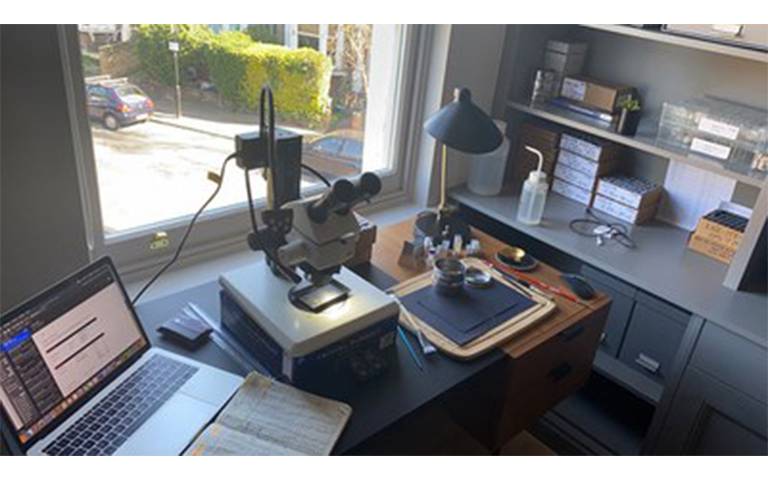Paleoceanography during a pandemic
12 August 2020
Jack and Eirini carry on research at home

Postgraduate and laboratory research can be solitary pursuits at the best of times, but the coronavirus pandemic has intensified researchers’ isolation. It also means that international travel and fieldwork are out of the question.
In UCL Geography, Jack Wharton, a NERC Doctoral Training Partnership (DTP) research student, and Eirini Papachristopoulou, a lab technician on the NERC ReconAMOC (Reconstructing Atlantic overturning over the past 7000 yrs) project, led by Dr David Thornalley, have described how they are coping with the unprecedented challenges of continuing their research during the UCL lock-down.
Jack writes:
"Like the majority of my fellow PhD students and research colleagues, COVID-19 has had a major impact on my ability to conduct independent research. Travel is banned, which means no fieldwork. The university is closed, which means no lab. work, and working from home means levels of procrastination not experienced since undergraduate times.
"However, as a fully funded PhD student, I’m in a really fortunate and privileged situation compared to many others. Fully funded means financial security for another 2.5 years. And my funding body (NERC), the department, and my supervisors have bent over backwards to be as supportive as possible (it’s these support systems that make university life feel so safe and womb-like compared to the ‘outside world’). The pandemic just calls for a new approach to research.
"As a paleoceanographer, closer to the beginning of my PhD rather than the end, my time is generally divided between two main activities: washing sediment (a posh word for mud) and looking down a microscope (at the mud)…"
So, as Jack describes it,
"With the labs being closed, the only way to continue this research (washing and looking at foraminifera) was to take the lab. home…."
How he, with others, did this in March is described Paleoceanography during a pandemic (.pdf).
Eirini also explains how she has managed the lockdown
"As a laboratory technician, most of my working routine includes tasks that can exclusively be done in the laboratory. When London started to go into lockdown due to Covid-19, all UCL staff from the department of Geography were called to leave the laboratories on the third week of March 2020. At that time, one of the key ideas that were brought forward by my supervisor was to take microscopes from UCL along with a great deal of already prepared samples and set up our own workstation at home! Indeed, this has not only helped us to conform with the social distancing guidelines, but also to continue our work and keep up with our research…
"… Although working far from your colleagues might be tough at times, especially when you have to identify foraminifera species (over 50,000 species are officially recognized, 10,000 living and 40,000 fossisl), the use of online platforms and tools has helped us achieve the best of teamwork while working separately…
"…As with many things in research, the need to overcome an obstacle gives space for creativity and allows new ideas to be put into action. Thus, although the past few months imposed for everyone different types of restrictions, we have been truly able to readjust to the new demands, troubleshoot old problems with a new perspective, and finally witness progress in our research."
Read a fuller description of Jack and Eirini’s experience of coping with lockdown (.pdf)
 Close
Close

